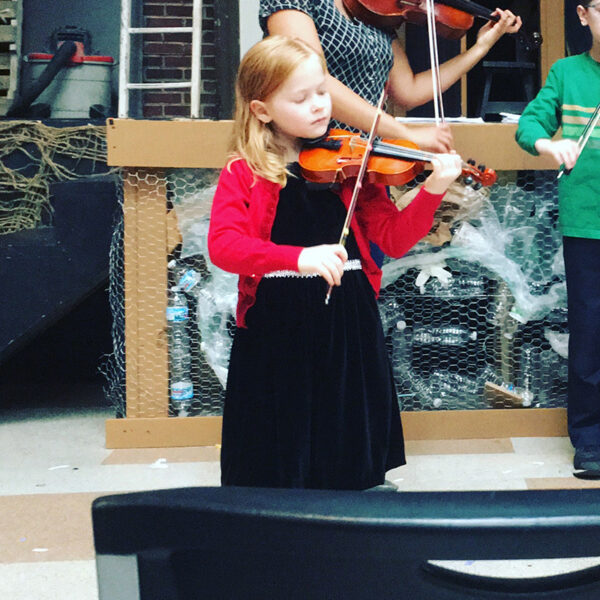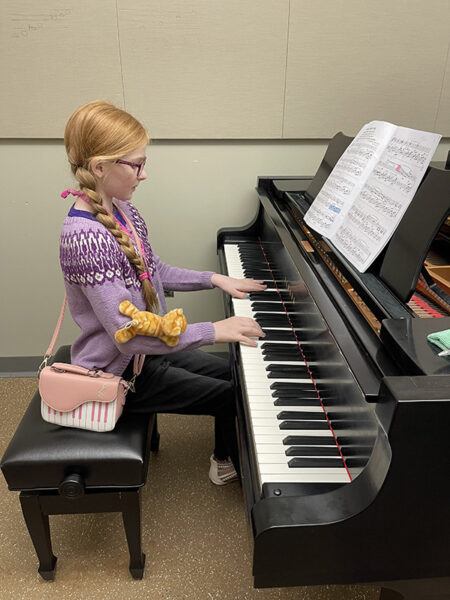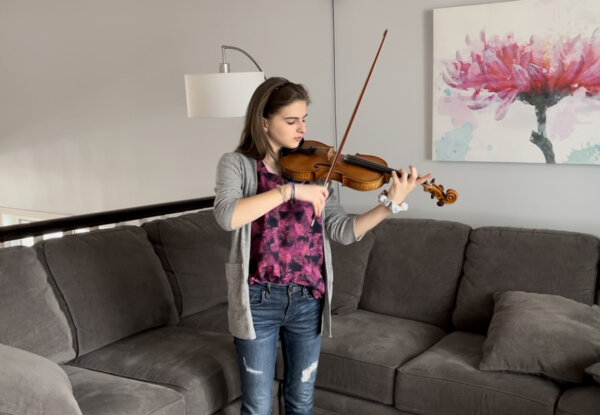A Vital Angle in the Suzuki Triangle: Parents
In MacPhail’s Suzuki Music Education Program, parents play a unique and meaningful role.
Thirteen years ago, when her older daughter was a toddler, Rebecca Weber read the controversial parenting memoir, Battle Hymn of the Tiger Mother. The book’s author detailed the strict and demanding methods that she used to raise strong, successful daughters. Among these strategies? The Suzuki method of learning to play violin and piano.
It wasn’t pretty: Critics denounced the author’s excessively rigid standards, grueling practice sessions, and occasional name-calling. And Ms. Weber agreed. But a few years later, when she was considering music lessons for her daughter, she heard a different take on the Suzuki method; a family member described an overwhelmingly positive experience. So, Ms. Weber enrolled her daughter in MacPhail’s Suzuki Music Education program.
That’s when she learned the truth: The Suzuki method is the opposite of rigid. It encourages, guides, and sustains children as they learn. And ironically, parents are a major pillar of that support.
“What’s described in that book has been nothing like my experience!” Ms. Weber says. Her two daughters, now 15 and 12, have developed into accomplished musicians who “love their instruments.” One plays violin and piano, while the other plays piano and viola. “It’s part of who they are,” says Ms. Weber. “They both identify as musicians and they don’t remember a time when they didn’t play an instrument, which is kind of cool.”
The Suzuki method is built on a system of meeting children where they are and celebrating even the smallest of accomplishments as they progress. The active participation of parents is a key element as they lovingly guide their children to reach their full potential.



The Suzuki Triangle
When Shinichi Suzuki created his music instruction method, he envisioned three sides of an equilateral triangle. The student, the teacher, and the parent would each play a part in the learning process. “Every family is different and has different ways of interpreting things,” says Joe Kaiser, an instructor of cello and chamber music at MacPhail’s Suzuki Education program. “But we Suzuki teachers really see the triangle as the ideal.”
The parent’s role is especially crucial in the beginning. Suzuki students generally start lessons at three or four years old—a time when small children are still orbiting their parents like planets around the sun. “Now they have this new adult in their life telling them to do things,” Mr. Kaiser says. “It’s critical that they’ve got their parent there to introduce them to this concept that other people can serve as a teacher for them.”
Parents attend all the lessons, absorbing the instruction and taking notes. “Very young children aren’t handed a book at the end of the lesson,” says Joy Moeller, a Suzuki violin instructor at MacPhail. “The parent is basically going home and communicating my notes in practice sessions.” At home, the parent plays recordings of the music that the child is learning to facilitate ear training.[TB1]

Parents Learn, Too
During the first semester after signing up for MacPhail’s Suzuki Education program, the parents attend a 6-week parent educational class that meets on Saturdays, in addition to the individual lesson. There[TB1], they learn about the program’s methodology and meet other parents experiencing the joys and challenges of raising a musician.
Before a child even begins[TB2] lessons, Suzuki teachers devote several lessons (the amount differs per teacher) to instruct the parent on the instrument. “We set the parent up as an example to their child,” Ms. Moeller says. “They learn how to play, too, and it gives them an inside look at what this entails.”
“Yes, I had to get my own violin!” says Rebecca Ark, whose three teen daughters (a 15-year-old and 14-year-old twins) have been in MacPhail’s Suzuki program since they were preschoolers. “The teacher said, ‘I want your daughter to observe you doing it, so you have an idea of how to teach at home.’”
Mr. Kaiser points out that this is also important because the teacher only sees the students once a week. “When I’m not there,” he says, “the parents are the ones who show the child how to find the notes on the cello, hold the bow, and make a sound.”
After her six weeks of lessons, Ms. Ark even did a little performance at the school.
“It gave me an idea of the instrument’s difficulty,” she said. “I learned that I had to be patient with myself, which translated into being more patient with my three-year-old. I knew firsthand that it wouldn’t happen overnight, so I learned perseverance and empathy.”

And her daughter also learned that violin was something she wanted to do. “When I was playing violin, she knew she would start soon. She got so excited. ‘Oh, Mommy’s practicing now!’”
Little did Ms. Ark know that in the years to come, her daughter would be the concertmaster of the MacPhail Chamber Orchestra, and she auditioned for and was accepted into the Minnesota All-State Orchestra. Her younger twins are in MacPhail’s Sinfonia orchestra and the Chromatic Quartet through MacPhail. All three are also involved in Vivace Violins, an advanced violin performing group at MacPhail.
Ms. Weber and Ms. Ark have been friends since meeting in the parent education class years ago. Ms. Weber says she had a similar experience when she was asked to learn to play first: “My daughter would see me doing it, and she’d want her turn. And then she very quickly surpassed me!”
Parents and Students, Growing Together

There’s no doubt that parents of Suzuki students invest a lot of time in a child’s instruction, but it’s not forever. “Our process is that we are planning to train up a competent and independent learner,” Ms. Moeller says. “And part of that is, at some point, we’re going to wean them off their parent. By the time students are in high school, they don’t need mom and dad sitting in on their lessons. Parents, or another adult practice partner, are no longer taking notes or necessarily following up on practice sessions.”
While Ms. Ark no longer attends her 15-year-old daughter’s lessons, she still sits in with her 13-year-old twins. “But they are starting to develop independence in practicing.”
Mr. Kaiser says that in his experience as a teacher, the Suzuki parent’s role changes over time. Older students need different kinds of support.
“When I’m coaching parents to guide their student in practice, the important thing is making it developmentally appropriate,” he says. “With a three-year-old, it’s about ‘How can I make cello practice feel like a game?’ With a high schooler, you talk to them about the importance of self-discipline and time management.”
As the child grows older, the teacher’s long-time relationship with the parent greatly benefits everyone. Mr. Kaiser recalls working with a high school freshman who was beginning to struggle as he perfected the final movement of a concerto. It was a difficult challenge for this student, who had never had to put this much practice time into a piece.
“One thing I learned with that ninth grader—and with kids of all ages—is that sometimes they’re not going to tell you what’s going on,” he says. “A teenager isn’t necessarily going to say, ‘I feel like I’m burning out.’ But the parents will tell you. So, I have another insight into how the student learns and develops. It’s someone who can help point out where the challenges are.”
In that instance, the parent attended the next lesson, and “amidst the three of us, we worked on motivation and came up with ways to intricately solve some of his technical problems.”
Unique Relationships

Unlike the relationship portrayed in Battle Hymn of the Tiger Mother, Ms. Ark says the Suzuki program has brought her and her daughters closer.
“It’s always been our special time together,” she says. “And it’s time that I get to spend with each kid. It’s not always roses, but we have improved at interpreting one another’s moods!”
Ms. Weber, too, believes that the time spent on Suzuki has facilitated a closer relationship with her children, though there have been times when she was fried after a day of homeschooling and guiding their music practice.
“But yesterday, I was sitting at the dining room table,” she says. “And when they finished their schoolwork, they sat at the table, and we were all hanging out together.” She knows that teen girls voluntarily hanging out with their moms isn’t a blessing to be taken for granted.
And, of course, there’s nothing like watching your children grow in ability and character, which is a Suzuki hallmark. In an increasingly polarized society, MacPhail’s Suzuki program is where courtesy and encouragement take precedence over a competitive mindset.

“We want to give them role models and expose them to more advanced children,” says Ms. Moeller. “But we don’t pit them against each other.” Ms. Ark has noticed that “when we ask friends what you are working on, the answer is always something like, ‘bow hold technique’ versus ‘what piece am I on.’”
Parents are encouraged to clap for everyone’s child at recitals, not just their own. “We are part of a community, and everybody in the recital is your student too,” Ms. Moeller says. “And then we let that respect for other people carry into the rest of their lives.”
Ms. Ark also notes that her children have learned perseverance. “They know they can do hard things just by spending time breaking down difficult sections into smaller pieces,” she says. “And that’s helpful in any part of your life.”
She recognizes that not everyone has the time to devote to the Suzuki program. But as a stay-at-home parent, she says, “I thought this would be a nice thing to do together, and I could give them the gift of music starting at an early age. You never hear a parent say, ‘I wish I hadn’t done that.’”

